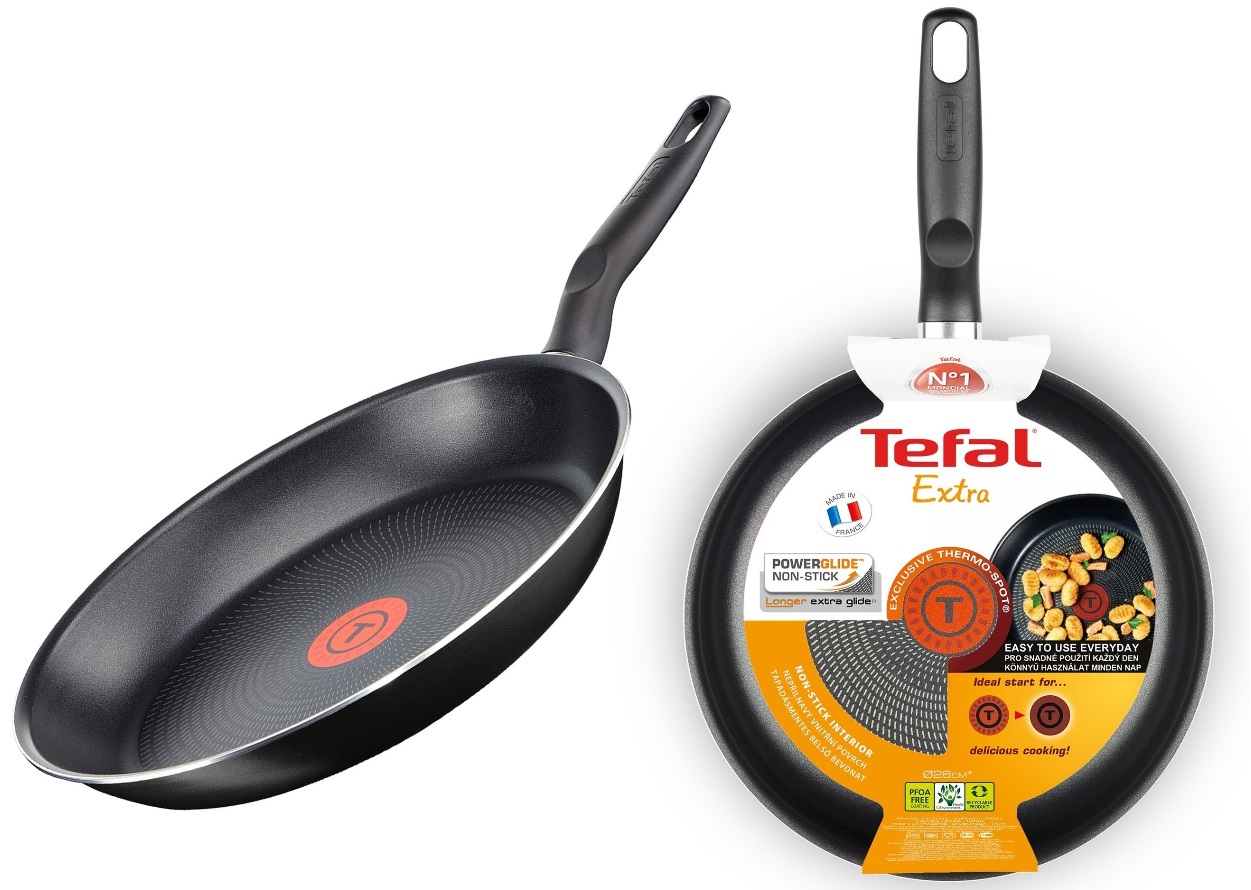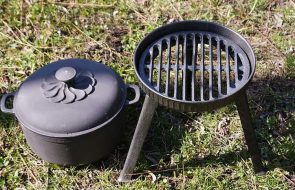What is Teflon? How is Teflon coating harmful to a frying pan? What are the advantages of Teflon frying pans? How to use a new frying pan correctly? How to clean and care for a frying pan with a non-stick Teflon coating?
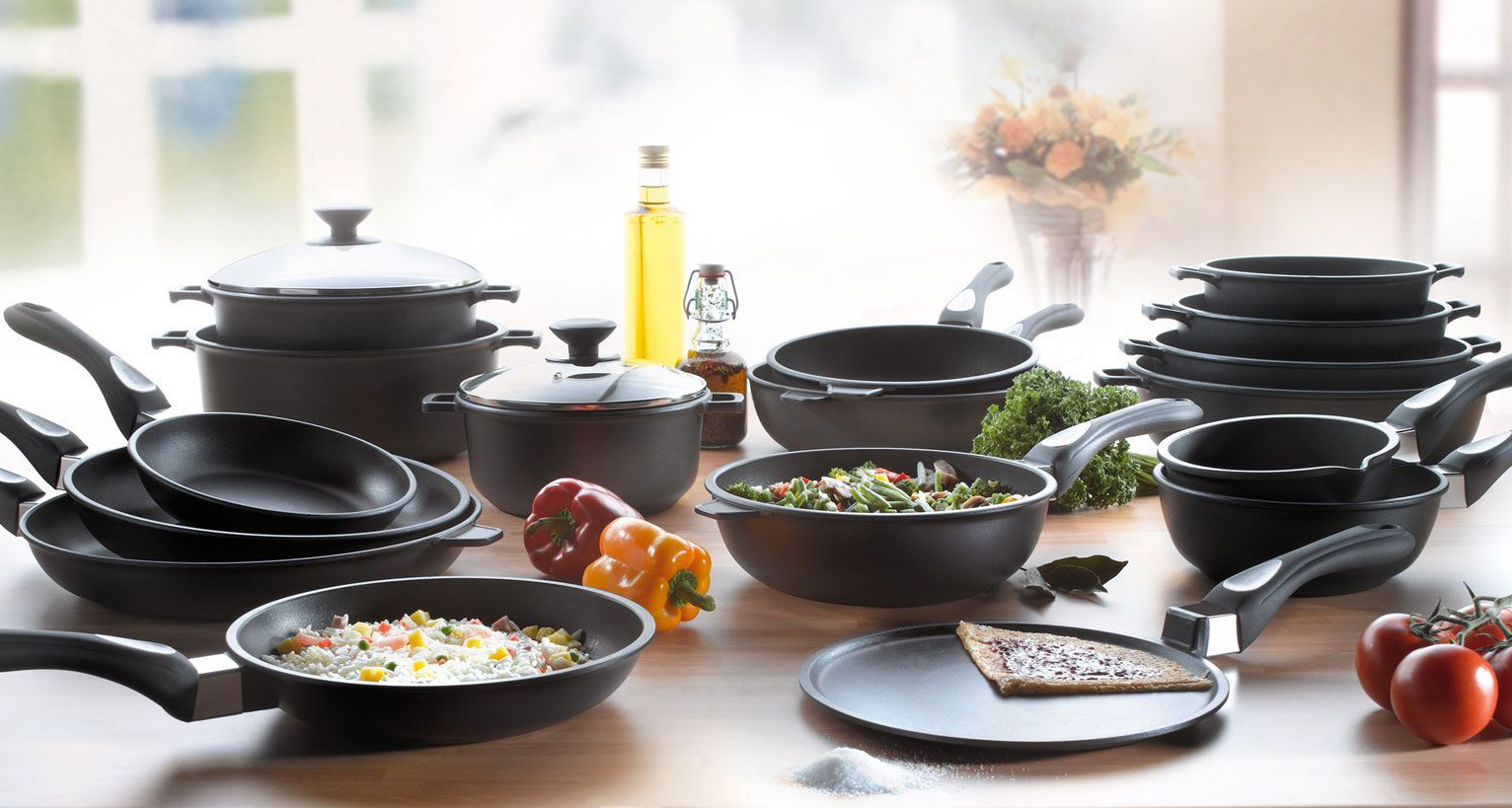
Content
- What is the material Teflon
- What are the advantages and disadvantages of Teflon pans?
- What are the harmful properties of Teflon coating for humans?
- How to Properly Use a New Teflon Frying Pan
- Which coating is better, Teflon or ceramic
- Recommendations for choosing a quality cast iron frying pan with a Teflon coating
- How to clean a Teflon frying pan from carbon deposits at home
- How to remove teflon from a frying pan
- Is it possible to restore teflon coating
- Caring for a Teflon Frying Pan
- How long do teflon pans last
- Popular manufacturers of teflon pans
- VIDEO: How to check the Teflon coating of a frying pan.
What is the material Teflon
Long gone are the days when the weight of a cooking utensil was considered an indicator of its quality. After all, it was a heavy frying pan that prevented food from burning, and it was convenient not only to bake but also to stew vegetables and meat. Modern cooking utensils are lightweight and practical. They can be used to cook even without oil, which makes home-cooked meals not only tasty but also healthy.
There are many types of non-stick coatings, but Teflon is considered the most popular and widespread. Let's consider the main features of this material.
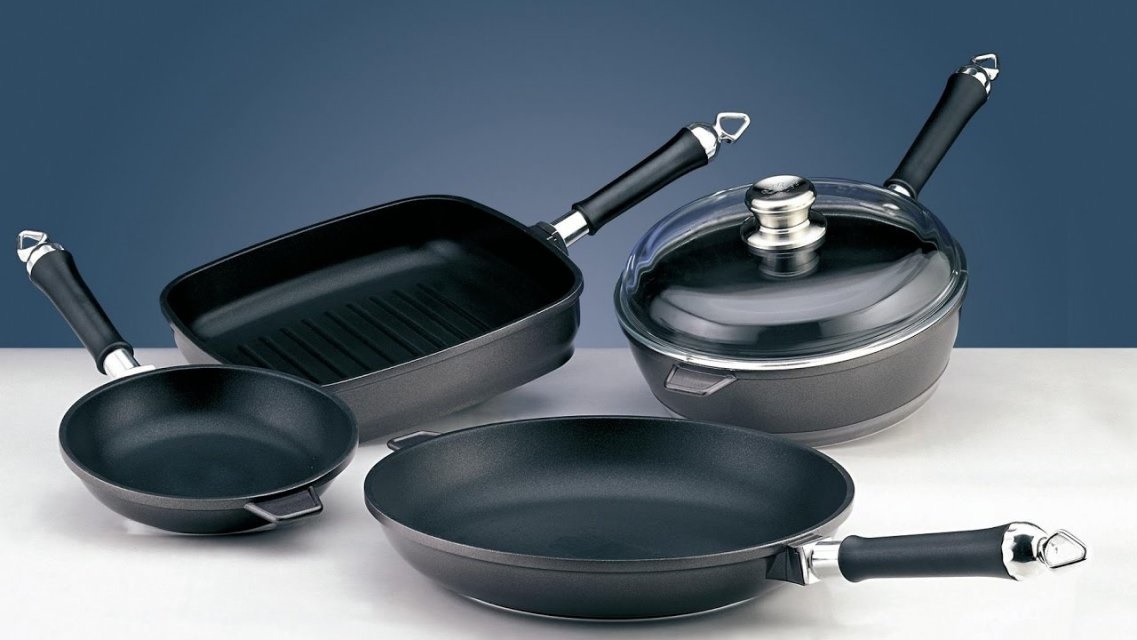
Teflon is a very interesting material. It was created before the Second World War by the American company DuPont. It is essentially a gas that polymerized and became polytetrafluoroethylene resin.
It was used in many areas of science and production, even prosthetic joints were made from it. Teflon gained its greatest popularity when they began to produce frying pans with a non-stick coating. Here it took one of the first places.
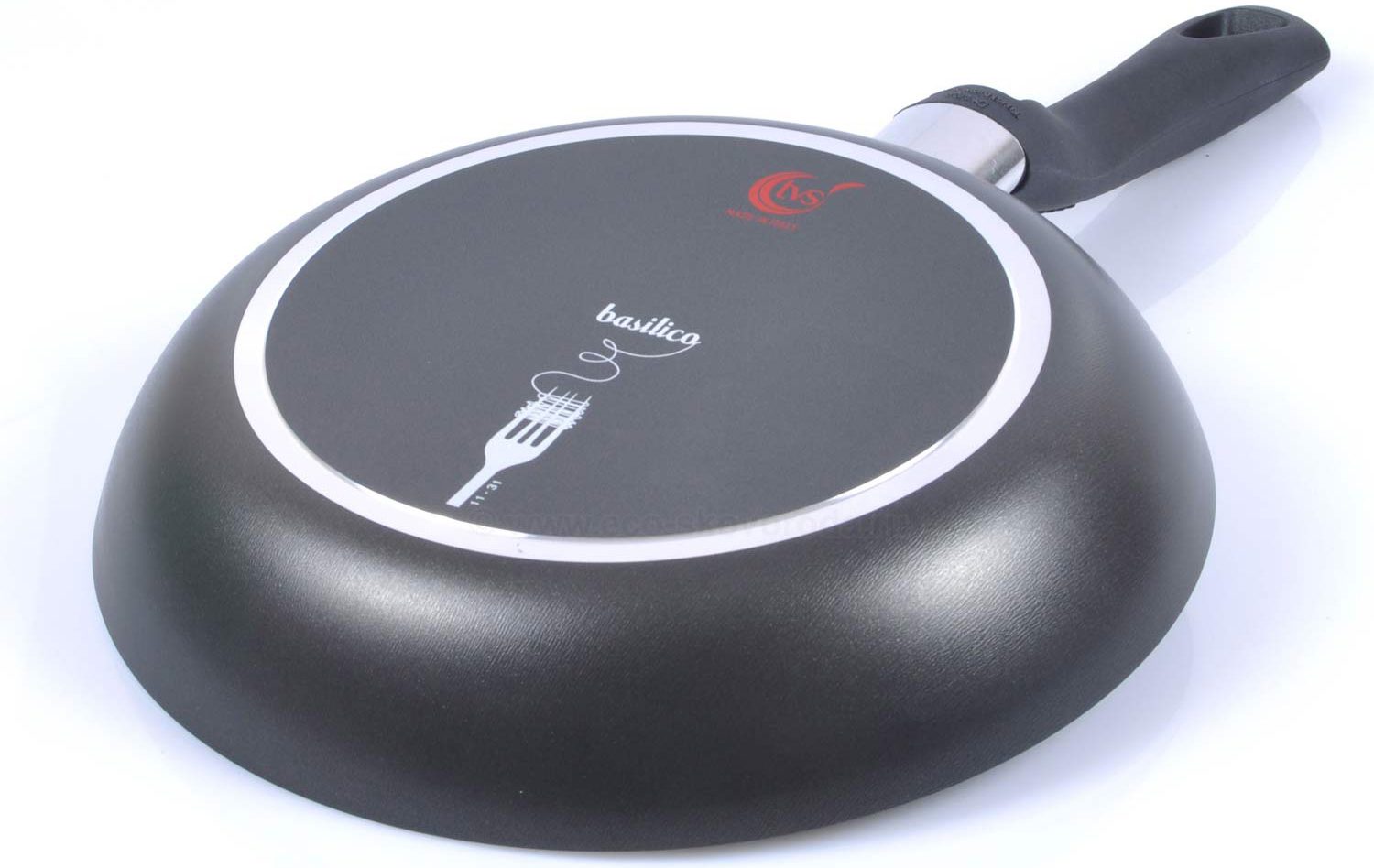
What are the advantages and disadvantages of Teflon pans?
Any material combines positive and negative qualities. On the one hand, it is simply irreplaceable, and on the other hand, it requires special care or handling skills. This also applies to such a common material for non-stick coating of frying pans as Teflon.
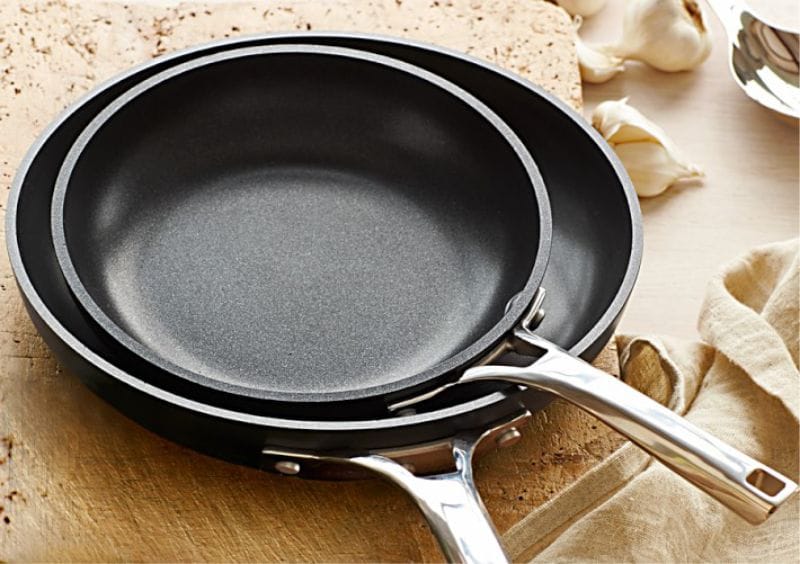
Let's consider them in more detail.
Advantages:
- Teflon coated pans heat up quite quickly. This makes the cooking process more convenient and not very time-consuming.
- Teflon coating prevents the growth of pathogenic organisms.
- Cooking on them is also convenient because you don't need to use a lot of oil. It's enough to just lightly grease the frying pan with a whisk or you can do without it altogether. Such food, in addition, becomes healthier and lower in calories.
- Frying pans with a Teflon coating are easy to clean, because food does not stick and can be removed with a soft sponge without much effort.
- Such dishes are distinguished by their light weight. Their lightness makes them more convenient to use.
- Teflon pans are quite durable, but only if the non-stick coating is not damaged.
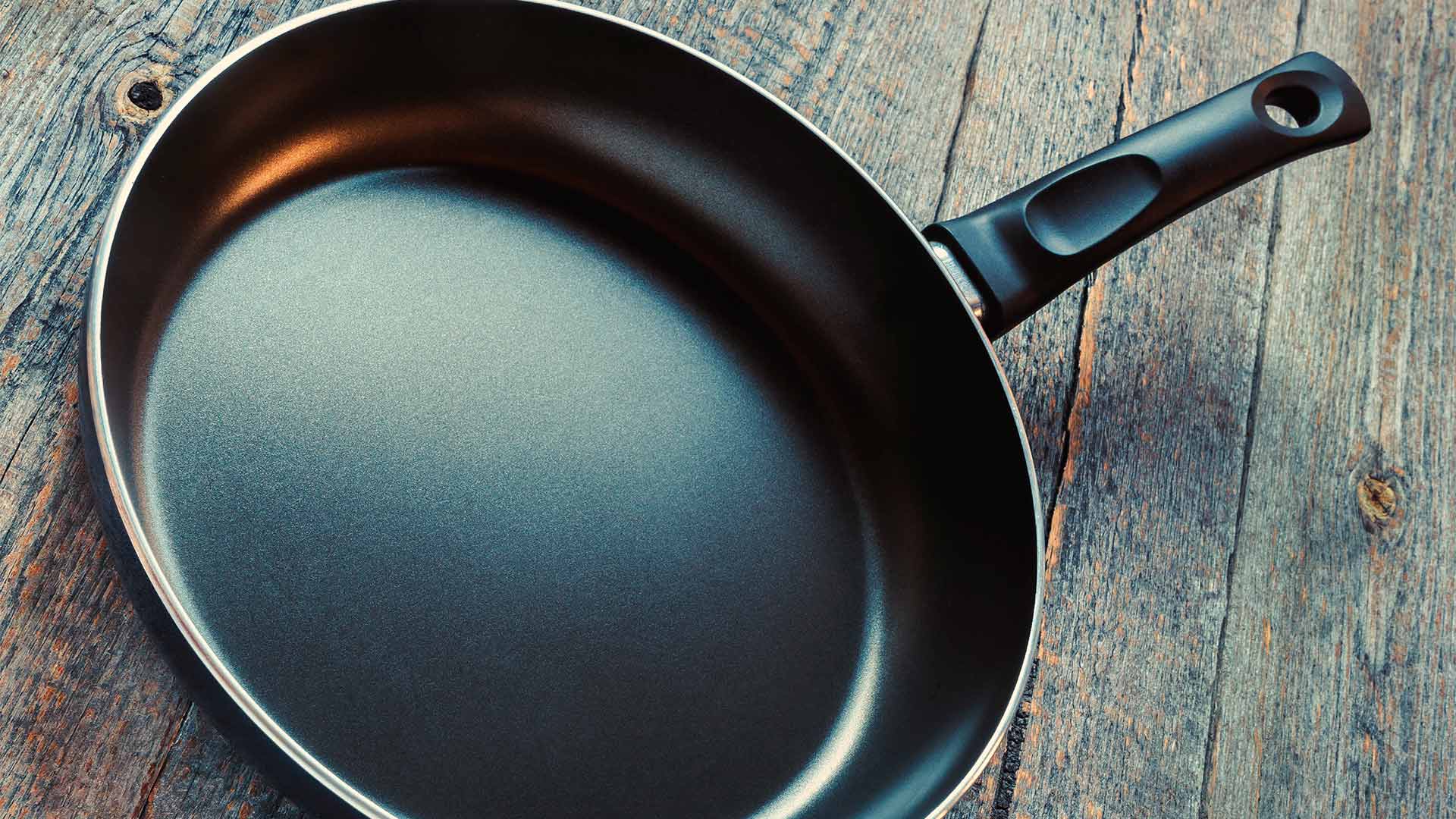
Flaws:
- The Teflon coating is quite fragile. If used or cleaned incorrectly, it can easily be damaged. For such a frying pan, it is better to use wooden, plastic or silicone utensils: spatulas, tongs, spoons.
- When using such pans, you should monitor the temperature regime. Violation of it can lead to damage to the coating.
- If the integrity of the Teflon coating is damaged even slightly, the frying pan becomes unusable.
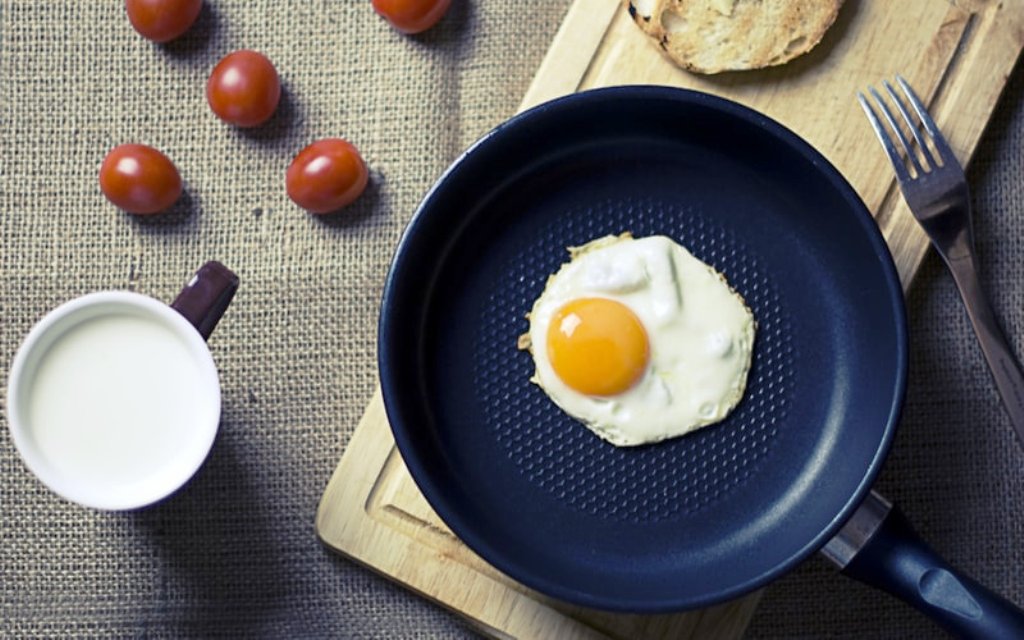
Please note! Teflon does not like too high temperatures (overheating occurs due to too strong a fire or too thin bottom or side walls). If the frying pan is too hot, the polymer begins to evaporate. And this is harmful to health.
What are the harmful properties of Teflon coating for humans?
Teflon non-stick coating is very smooth, even slippery. It makes the cooking process easier and more comfortable. However, it should be noted that in recent decades the issue of its toxicity has been increasingly raised.
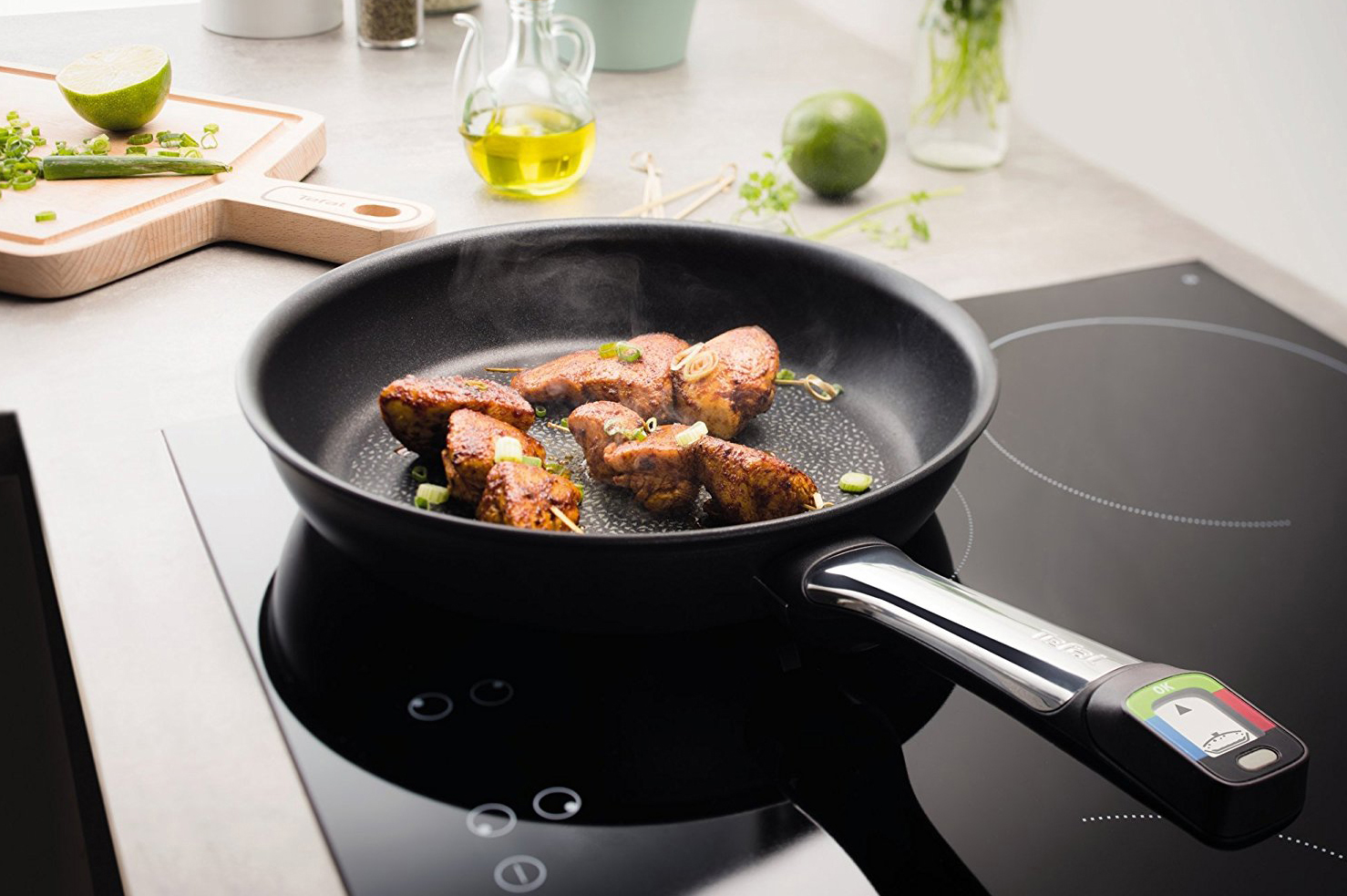
Despite the fact that Teflon has long been considered safe, laboratory studies have shown that this material can negatively affect human health. Let's consider what its danger is.
The "insidiousness" of Teflon is as follows: at temperatures up to 200 degrees, it does not pose any threat, but after exceeding this temperature limit, this material begins to disintegrate into components. And these are the carcinogens. The most dangerous of them are considered to be perfluoroisobutylene gas and perfluorooctanoic acid.
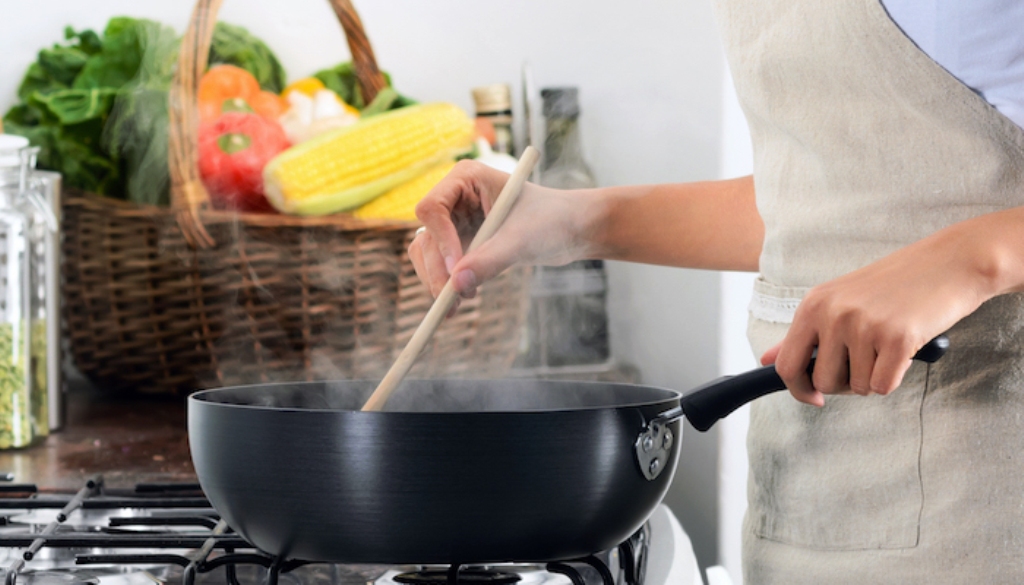
These substances affect the thyroid and pancreas, disrupt the immune system. They also contribute to cell mutation and the development of cancer. Their negative impact is the cause of hormonal disorders.
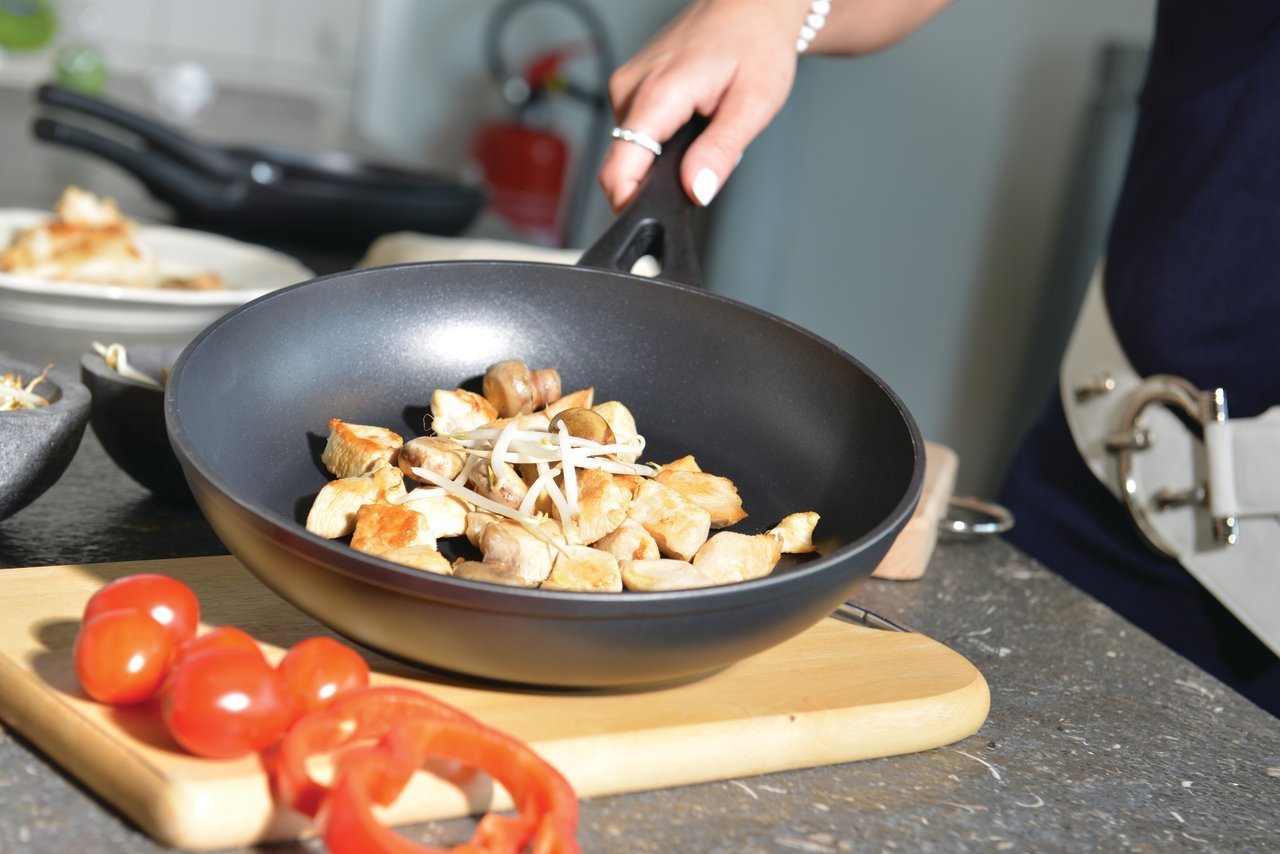
How to Properly Use a New Teflon Frying Pan
In order for a new frying pan with a Teflon coating to serve as long as possible and perform its functions well, it is necessary to carry out a special procedure before the first use. Wash it well, removing everything unnecessary (without using abrasives and metal scrapers, and sponges), dry it and hold it for half a minute on low heat. After this, it is advisable to lightly grease the frying pan with sunflower or other vegetable oil.
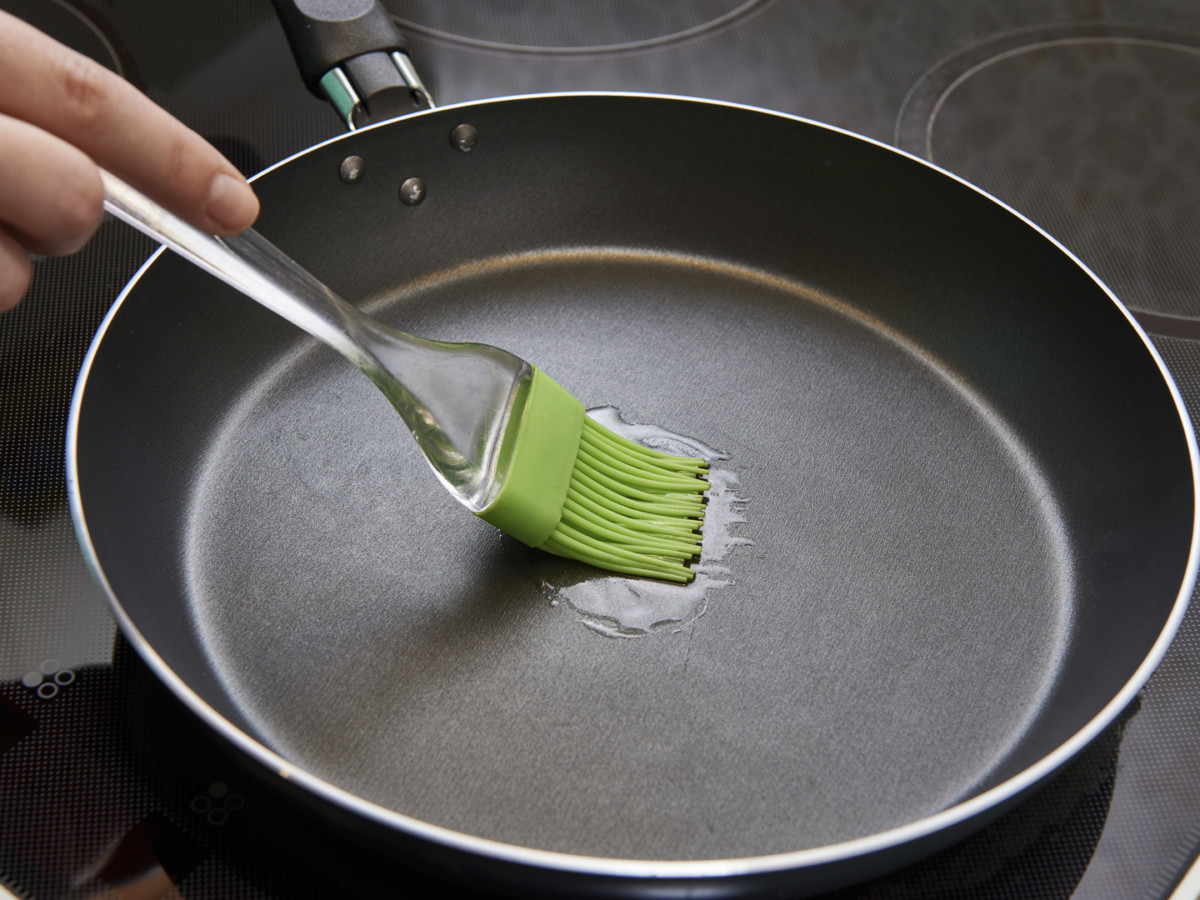
These simple steps will prepare the non-stick coating for further cooking processes and protect it from damage.
Which coating is better, Teflon or ceramic
Ceramic, along with Teflon, is one of the most popular non-stick coatings. To figure out which one is better, let's look at the pros and cons of the first.
Advantages of ceramic coating:
- Withstands very high temperatures - about 450 degrees.
- More resistant to mechanical damage than Teflon.
- During the cooking process, you can use a small amount of oil (only the minimum necessary).
- Easy to clean.
- Does not release carcinogenic substances when heated.
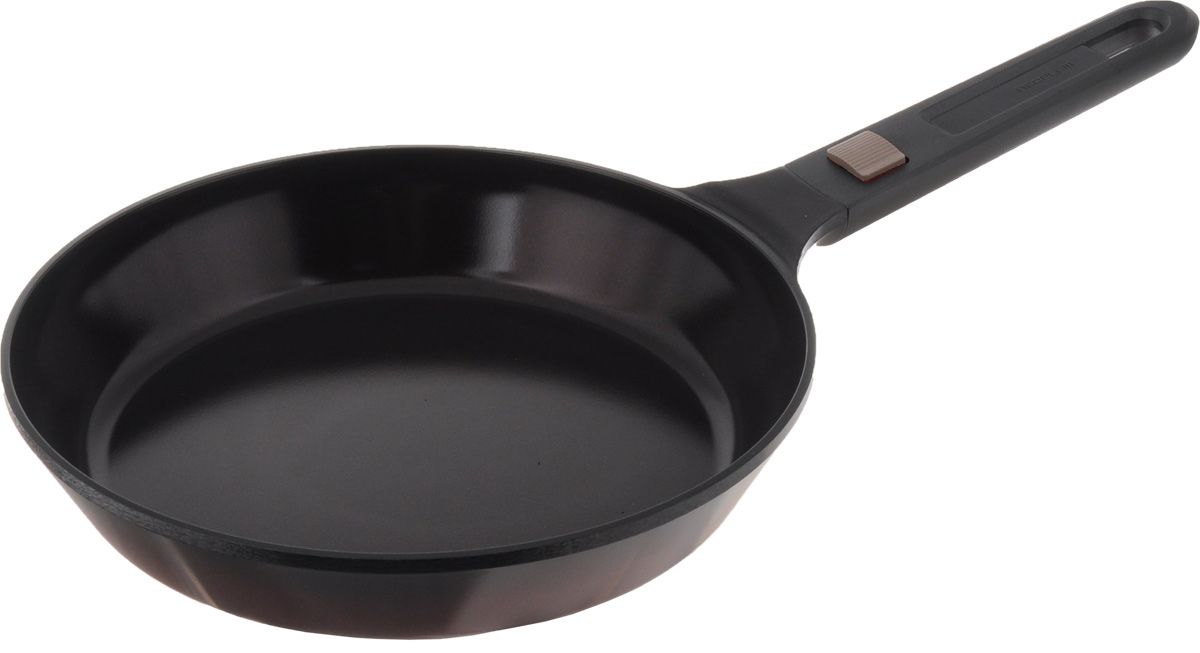
Disadvantages of ceramic coating:
- Afraid of too much temperature change (a hot frying pan under cold water).
- You cannot use metal utensils, only wooden, plastic, and silicone ones.
- You shouldn't soak such items for a long time. It's better to wash them right away.
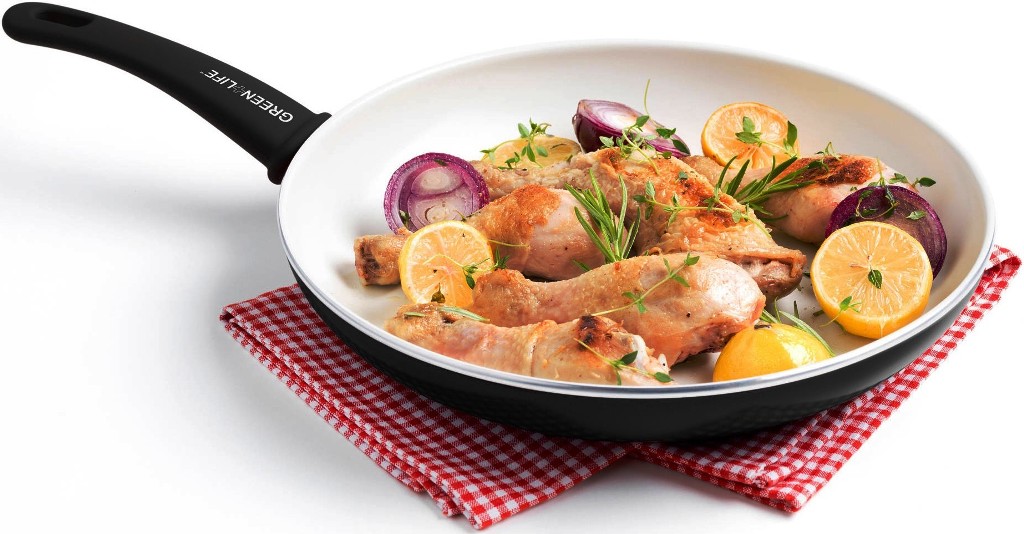
Based on the characteristics of the ceramic coating, we can conclude that it is an environmentally friendly alternative to Teflon, while having all its positive characteristics.
Recommendations for choosing a quality cast iron frying pan with a Teflon coating
A cast iron frying pan with a non-stick coating is a very important piece of cookware. It has a number of functions, and therefore, when buying it, every housewife wants to get a practical and convenient product as a result. To avoid disappointment with your purchase, you need to pay attention to important recommendations.
- The bottom of such a frying pan should be as thick as possible. The same applies to the walls.
- To control the heating level, it is recommended to buy frying pans with a special indicator. It is located on the bottom inside and changes color depending on the temperature.
- It is best to choose pans with a very ridged bottom. The more ridges, the better.
- If the bottom is smooth, without relief, then it should be perfectly flat. Pits or bumps indicate defects, in which case such a product cannot be used.
- When choosing an external coating, it is recommended to give preference to enamel. It is more resistant to mechanical damage (including when trying to clean). Lacquer is quickly scratched and burnt.
- The size of the bottom should correspond to the diameter of the burners. If it is smaller, the food near the side walls will burn, if it is larger, it will remain undercooked.
- The handle is more comfortable and will last longer if it is cast, that is, if it is a single unit with the entire frying pan. The material for it should have low thermal conductivity. This will protect against burns.
- Before purchasing a cast iron skillet, you should inspect it carefully. It may be damaged during transportation.
- You should not buy Teflon frying pans in stores without a special license for the product and a certificate of conformity. Such products may be counterfeit and harmful to health.
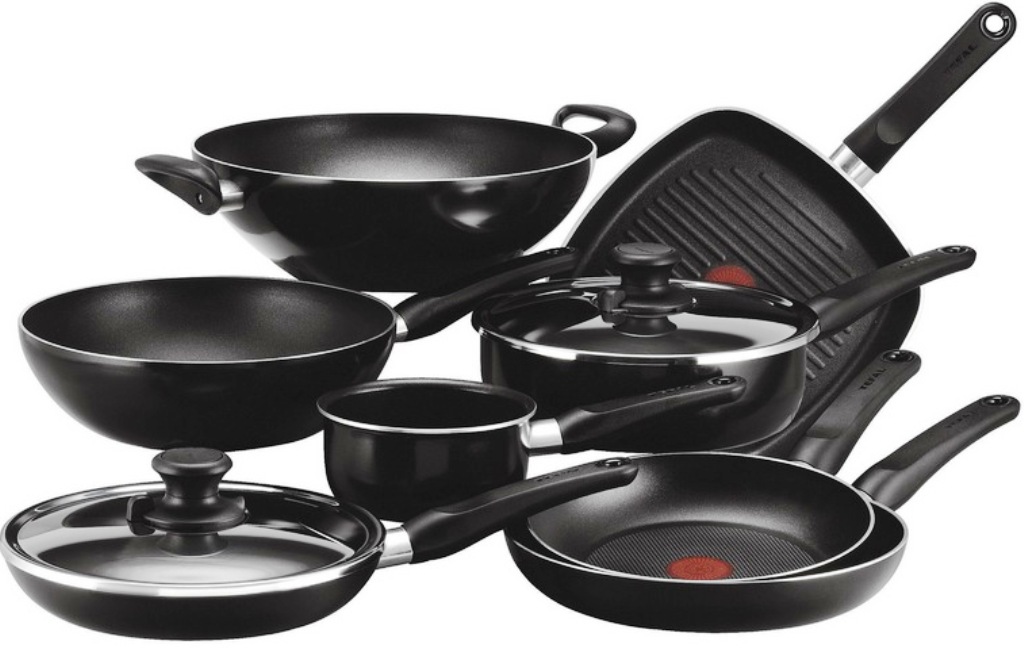
How to clean a Teflon frying pan from carbon deposits at home
Despite the non-stick Teflon coating, over time such pans are still prone to carbon deposits. Its presence not only interferes with cooking, but can also release harmful substances into food. Therefore, the question arises: how to clean a Teflon cast iron pan from carbon deposits?
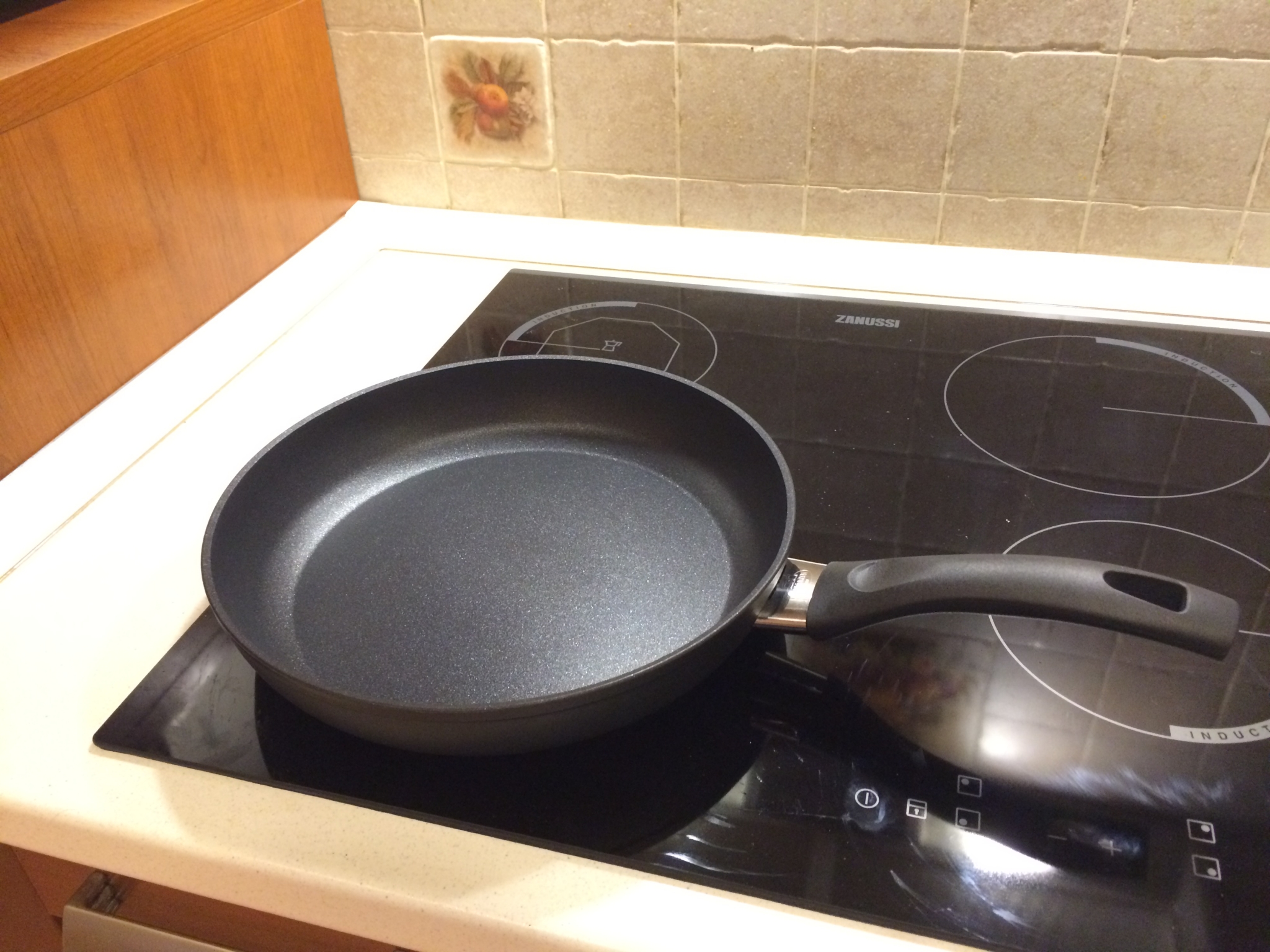
The complexity of the process of its removal is explained by the fact that when cleaning the non-stick coating, you cannot use abrasive agents or devices that can scratch it. Therefore, for this procedure, you should use only gentle cleaners. Let's consider the most effective of them.
Inside
As a rule, for cleaning the inner surfaces of dishes, use products that are not toxic or carcinogenic, because they will penetrate, at least partially, into the products being prepared. The most gentle and safe are:
- Laundry soap.
Recipe: Grate a quarter of the bar, put it in a frying pan, add water. Bring the mixture to a boil, but do not let it boil. Leave for 2-3 hours. Then drain the solution and wash the surface with a regular dishwashing detergent. Remove residue with a sponge. Rinse.
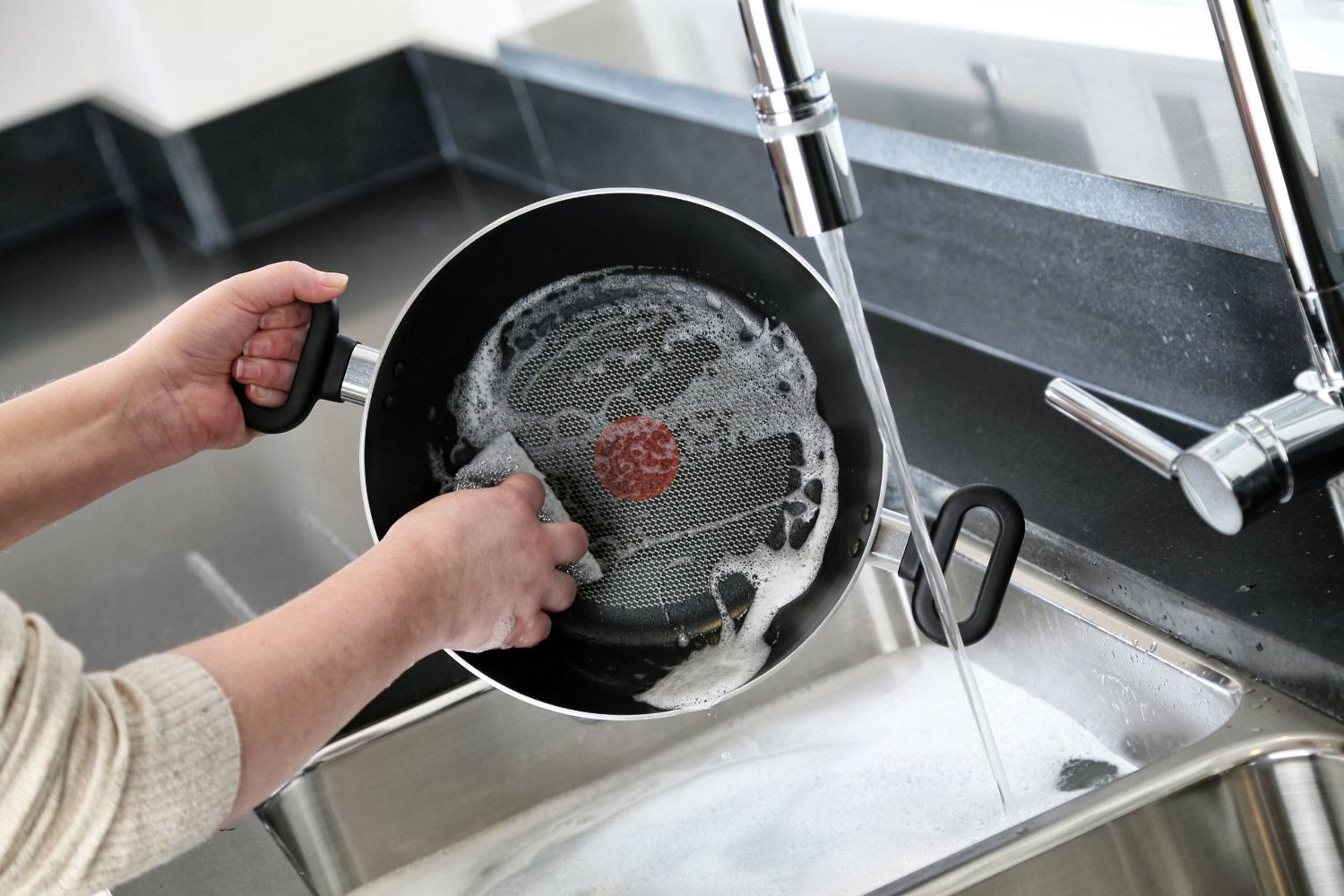
- Soda.
Recipe: Mix 5 teaspoons of soda with 1 liter of water. Pour into a frying pan, boil for 20 minutes. Drain. Rinse with clean water, if necessary, with detergent.
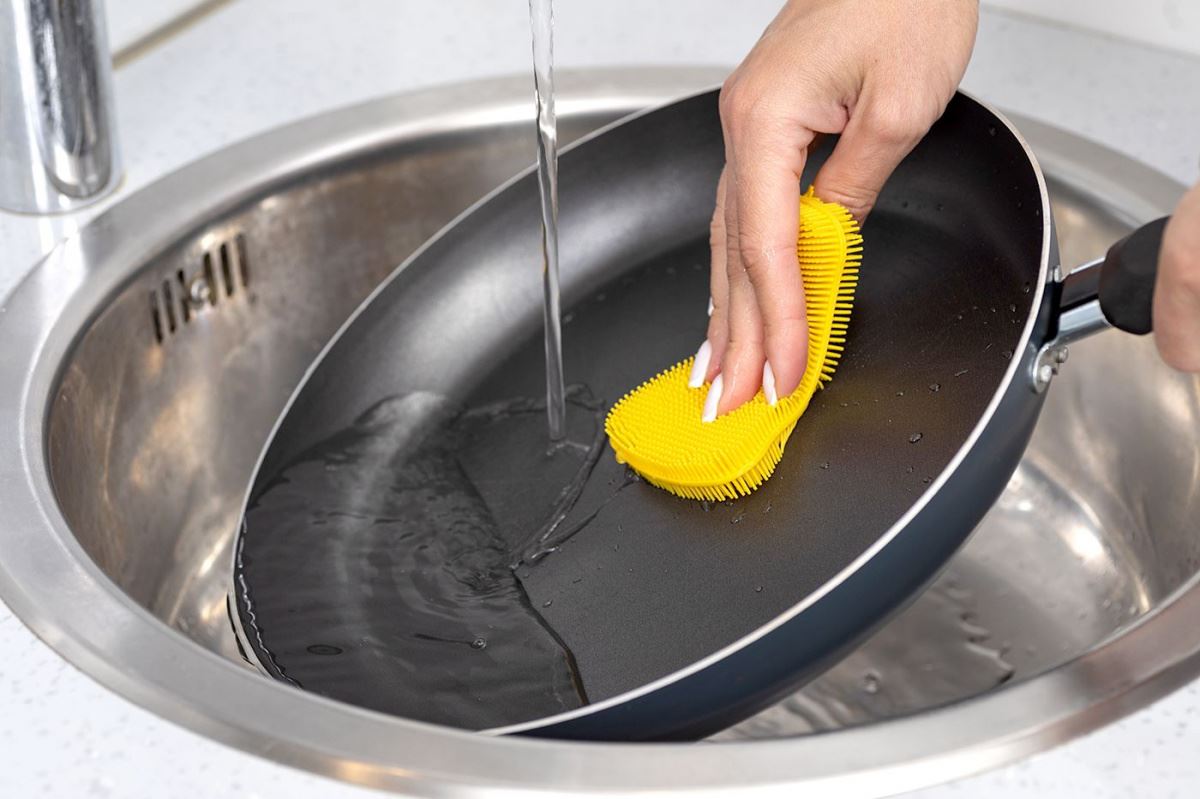
- Baking soda and dishwashing detergent.
Recipe: Dissolve 1 tablespoon of soda in 1 liter of water, add a couple of drops of detergent. Pour it into the frying pan. After boiling, remove from heat and let cool for 40-50 minutes. Rinse.
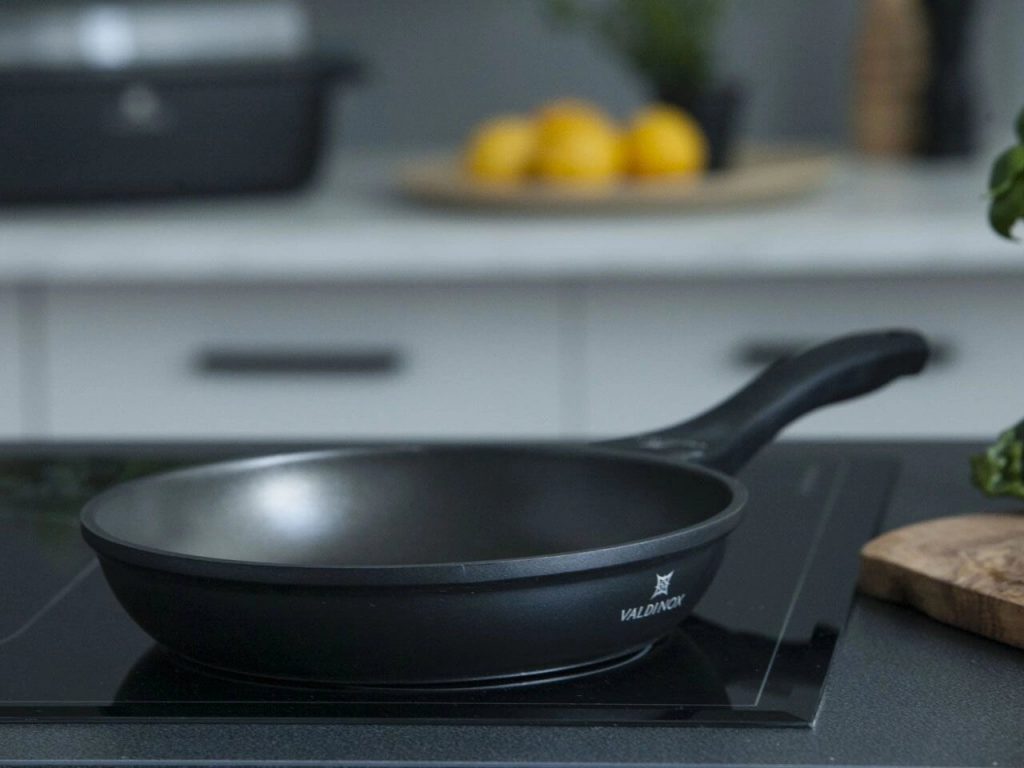
- Soda and office glue.
Recipe: Mix 1 bottle of office glue with a third of a pack of soda. Pour into a frying pan half filled with water. Boil for 40-45 minutes. Remove from heat for 2-3 hours. If the carbon deposits are very strong, the settling time can be increased to 24 hours. Wash thoroughly with detergent.
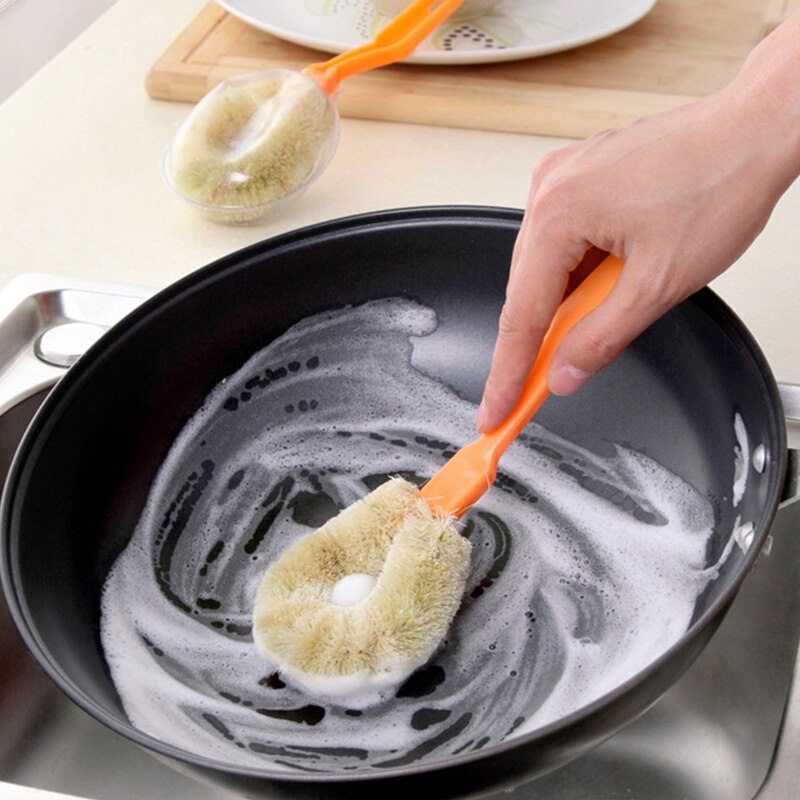
Outside
The cleanliness of the outer surface of the frying pan is just as important as the inside. If there is a thick layer of carbon deposits, its heating will be uneven, and burning will contribute to the formation of smoke. When removing carbon deposits from the outside of a Teflon frying pan, it is necessary to ensure that detergents do not get inside during cleaning. Since household chemicals can affect the quality of the food being cooked.
For such purposes, concentrated or spray gels and liquids are most often used. They are left for 15-30 minutes, then removed with a sponge and rinsed.
If the use of cleaning chemicals is undesirable, then more conservative means can be used. Here are some of them.
- Laundry soap and baking soda.
Recipe: Grate 2.5 bars of soap and melt in water with 2.5 packs of soda. It is best to do this in a bucket or deep saucepan. Boil the frying pan in this solution for 2 hours. Wash with water and detergent. Rinse.
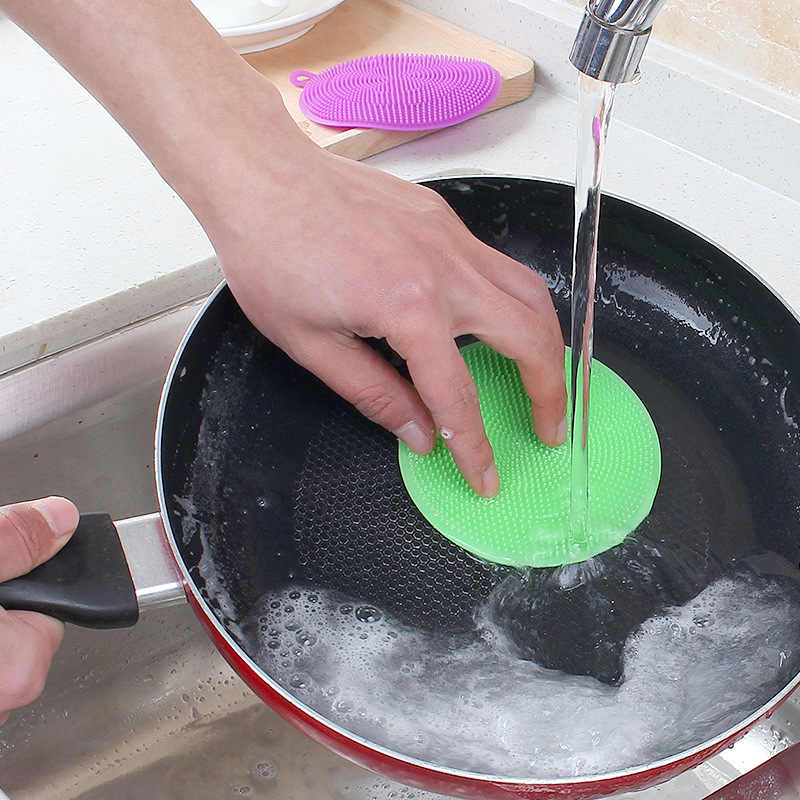
- Soda, detergent, office glue.
Make a solution of 3 liters of water, 150 grams of dishwashing liquid, 200 grams of soda, 50 grams of office glue. Soak the frying pan in it for 24 hours without boiling. Rinse with hot water.
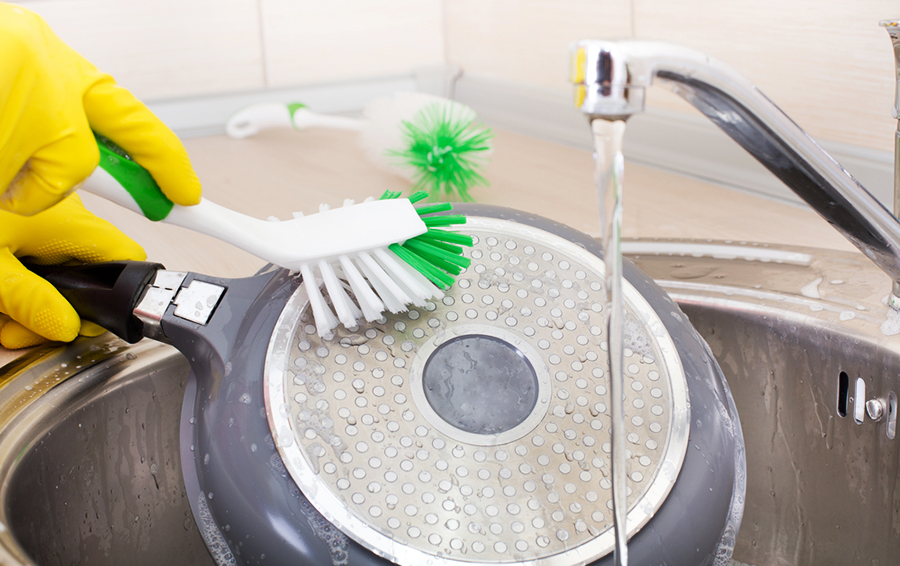
How to remove teflon from a frying pan
If the Teflon coating is damaged, some users try to remove it with abrasive materials, such as sandpaper or sandblasting. However, it should be remembered that such a frying pan becomes unusable. After removing all the Teflon residue, it cannot be used for cooking. Even if there are no residual harmful substances, it is almost impossible to fry in such a frying pan, since during the removal of Teflon, the top layer of cast iron is severely damaged, which leads to burning. Therefore, the answer to the question "How to remove damaged Teflon coating from a frying pan?" is the question "Is it worth it?"
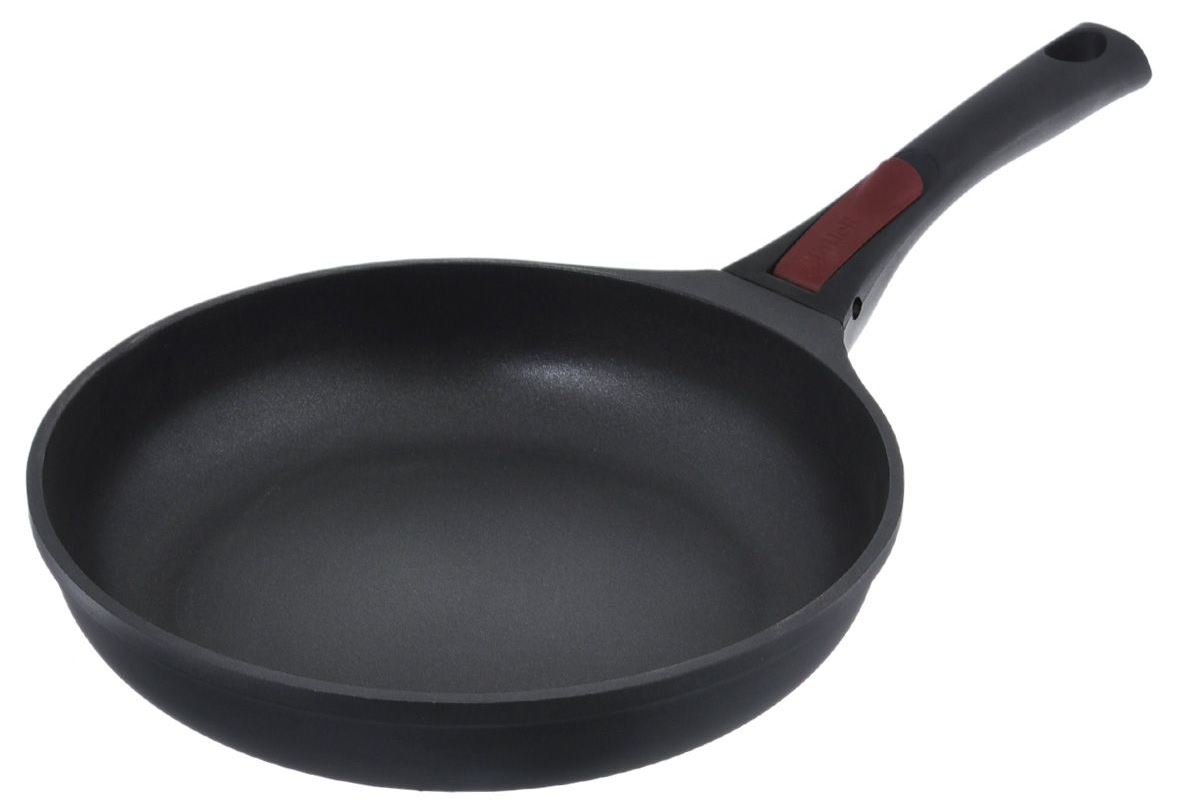
Is it possible to restore teflon coating
Damaged non-stick coating can be restored only in special service centers. However, when applying new layers of Teflon, various types of defects may appear that will shorten the service life of such a product, and such "reanimation" will be expensive and such workshops are not located in every city. It is easier to buy a new frying pan and be sure of its safety.
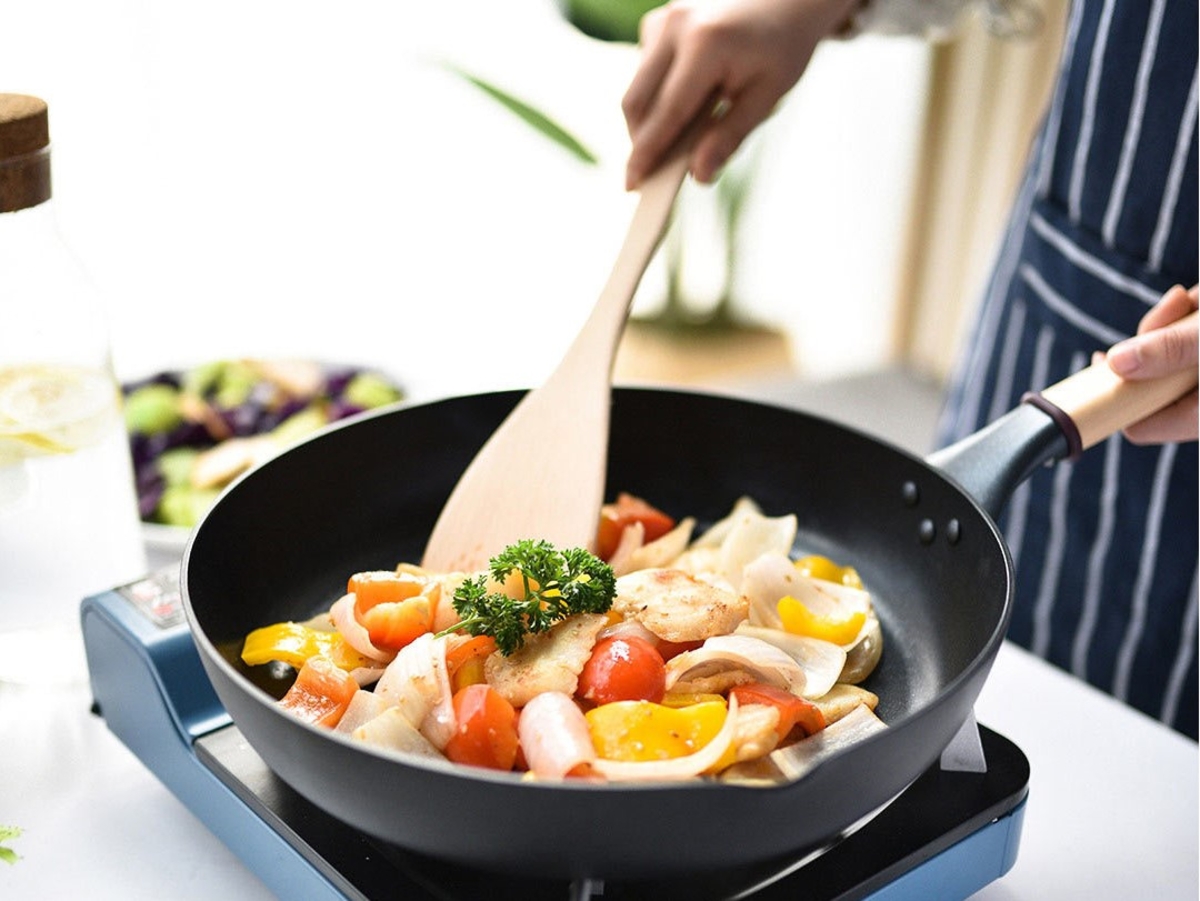
Caring for a Teflon Frying Pan
Teflon, like any other non-stick coating, requires special care. To keep it intact, you should follow a number of recommendations.
Rules for using a frying pan with a Teflon coating:
- Detergents should not contain scratching components (granules, microparticles).
- Do not use alkaline cleaners.
- You can only wash such a frying pan with soft cloths or sponges.
- When preparing a dish, it is forbidden to use metal utensils: forks, spoons, spatulas. Only wooden or made of special plastic.
- A sudden change in temperature is strictly prohibited: a hot frying pan cannot be placed under running cold water.
- You can cook on a non-stick coating without oil, but this will shorten its service life. It is better to lightly grease the bottom of the pan with a whisk dipped in oil.
- After cooking, the food should be transferred to another dish. The frying pan itself should be thoroughly washed and lightly oiled.
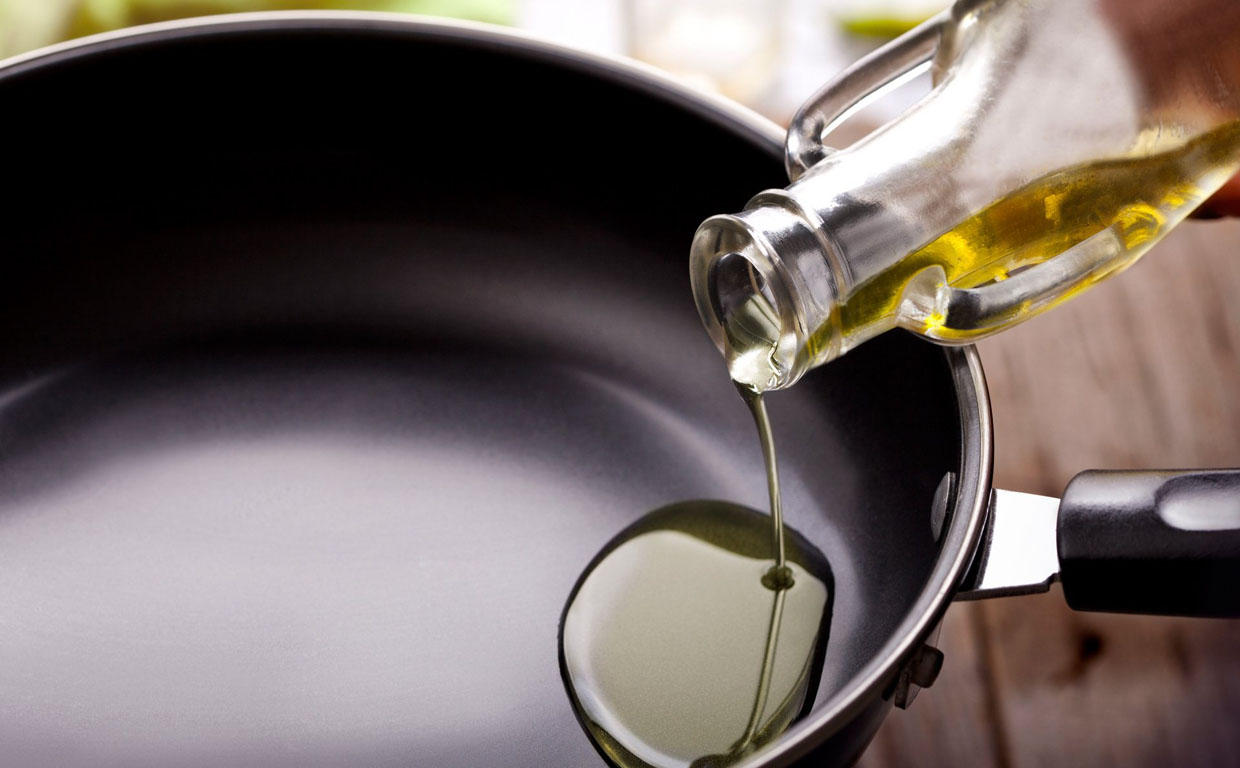
How long do teflon pans last
The service life of a Teflon frying pan depends on its thickness.
- 3-4 years – with a thin bottom and side walls.
- 5-6 years – with a cellular (not smooth) coating and a fairly thick bottom.
- About 10 years – with a thick bottom, side walls and multi-step Teflon coating (it has a rough texture).
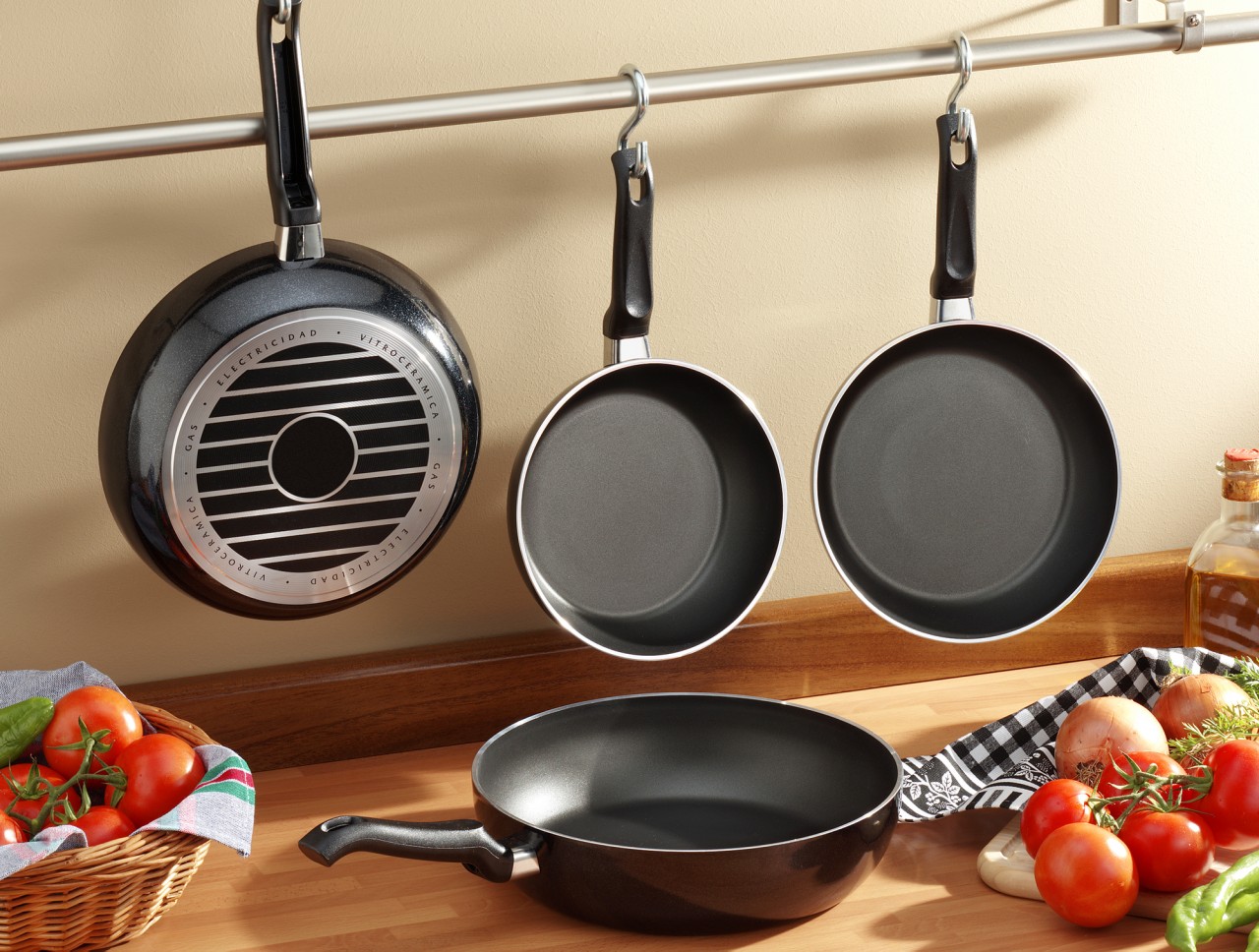
Popular manufacturers of teflon pans
The most famous companies engaged in the production of such dishes delight us with their new products and improved models from year to year. The leading ones among them are the following.
- Tefal.
- Rondell.
- Fissler.
- NMP (Neva-Metal Tableware).
- Gipfel.
- Vitesse.
Teflon coating is a convenient invention designed to make cooking easier. However, we should not forget that everything has two sides: positive and negative. When choosing a frying pan with such a non-stick coating, be very careful and cautious. And let your kitchen be safe.
